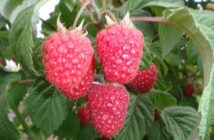Consumption of berries may have beneficial effects on health related to type-2 diabetes, cardiovascular diseases, obesity, neurodegenerative diseases and cancers. The beneficial effects may be due to the presence of protective polyphenol components in these fruits, scientists of the James Hutton Institute and the Rowett Institute have told delegates of the Scottish Society for Crop Research (SSCR) Soft Fruit Winter Meeting.
Dr Gordon McDougall, a research scientist at the James Hutton Institute, said: “Recent work has provided evidence that polyphenols from berries can have a range of beneficial effects on food digestion. New berry varieties with improved properties could be bred in the future, or new products formulated for specific health benefits.”
Dr Andreas Kolb, senior research fellow at the Rowett Institute, commented: “Using model systems and human studies, we are investigating the mechanisms by which berry bio-active compounds support cardiovascular health, weight management and the control of blood glucose levels relevant to type-2 diabetes.”
The research reflects current collaboration across scientific institutions funded by the Scottish Government’s Strategic Research Programme, and it is hoped findings of the project will inform the development of novel food products with improved health profiles.
Alison Dolan, secretary of the SSCR soft fruit subcommittee, commented: “As conditions such as diabetes and cardiovascular disease result in increased pressures over our health services, the Society is glad to present the latest research on the health benefits of soft fruit to growers, industry and the wider public.”
The SSCR meeting also saw delegates learn about recent research on soft fruit pests and diseases such as spotted wing drosophila and wine weevil, as well as conditions including crumbly fruit and dormancy.
Talks included a phytochemical analysis of honeyberries and how they compare to other soft fruit grown in Scotland, by Dr Dorota Jarret (James Hutton Limited), and an outline of a research framework to support the Scottish cherry industry, by Dr Julie Graham (James Hutton Institute).




